第6回講演会
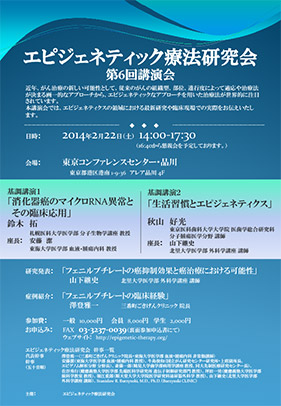
- 日程
- 2014年2月22日(土)
- 会場
- 東京コンファレンスセンター・品川
- 来場者数
- 約40名
- 講演内容
-
-
基調講演1
「消化器癌のマイクロRNA異常とその臨床応用」
鈴木 拓 (札幌医科大学医学部 分子生物学講座 教授)座長:安藤 潔(東海大学医学部 血液・腫瘍内科 教授)
-
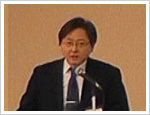
microRNA(miRNA)は18~22塩基程度の短いnon-coding RNAであり、増殖・分化・アポトーシスなど細胞の様々なプロセスに重要な役割を果たしている。がんではmiRNAの発現プロファイルが大きく変化しており、DNAメチル化やヒストン修飾異常などのエピジェネティックな変化が、そのメカニズムの一つであると考えられている。我々はがん細胞を用いたスクリーニングから、miR-34b/cをはじめ複数のmiRNA遺伝子のDNAメチル化異常を同定した。DNAメチル化は生検組織や血液、尿、洗浄液などから比較的安定かつ定量的に検出することが可能であり、バイオマーカーとしての有用性が期待されている。またサイレンシングされたmiRNAの発現を回復させることは有効ながん治療戦略となりうると考えられる。本講演では、消化器がんのmiRNA異常を中心に、近年の我々の研究結果を紹介したい。
-
基調講演2
「生活習慣とエピジェネティクス」
秋山 好光 (東京医科歯科大学大学院 医歯学総合研究科 分子腫瘍医学分野 講師)座長:山下 継史(北里大学医学部 外科学講座 講師)
-
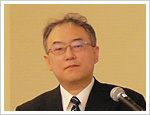
エピジェネティックな変化はがんや生活習慣病などの様々な疾病と密接に関わっている。従来より、DNAの変化と生活習慣などを疫学的に解析する分子疫学研究が盛んに行われ、遺伝子多型と疾患リスクとの関連性が明らかになっている。最近では、DNAメチル化と生活習慣などを疫学的に解析し、メチル化の程度をリスクとして評価しようという研究が注目されている。我々は、胃がん患者の生活習慣要因とDNAメチル化について解析し、緑茶摂取量や運動量ががん関連遺伝子のメチル化程度と逆相関することを報告するなど、エピジェネティック疫学研究を進めている。また、DNAメチル化異常は多くのがんで検出されるため、血液白血球DNAを用いたメチル化解析を行うことで、がんのリスク指標になりうるか、更には生活習慣が影響するのかは重要な研究課題である。現在、エピジェネティック治療薬としていくつもの薬剤の開発が進んでいるが、生活習慣の改善によりメチル化の程度を変化させることができれば、がんの予防にもつながる可能性が考えられる。
-
研究発表
「フェニルブチレートの癌抑制効果と癌治療における可能性」
山下 継史 (北里大学医学部 外科学講座 講師) -
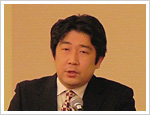
癌の標準治療は手術、抗癌剤、放射線、分子標的治療を組み合わせた集学的治療で一定の成果を上げている。他方、集学的治療はその毒性・効果において限界に近く、今後は毒性の低い新規治療 modality が求められている。癌の遺伝子変化の頻度は genomic よりも epigeneticにより高頻度に認められ、昨今epigenetic治療に対する期待感が高まっている。われわれはepigenetic 療法を新たな癌治療ツールとして使用すべくHDAC抑制作用を有する phenylbutyrate (PB) の癌細胞への効果に着目した研究を開始した。乳癌株化細胞での PB の効果は臨床投与量で十分な癌抑制効果を確認できた。しかし、その効果は細胞により異なった。細胞間での遺伝子発現プロファイルを調べると AKRD1, AXL, caveolin-1/2など化学療法抵抗性分子の発現とメチル化 tumor suppressor geneである TFAP2B等の発現に顕著な差を認めた。今後これらの遺伝子のPBへの反応性、ほかの epigenetic療法薬への反応性を調べ最重要な分子同定へとつなげたい。また、今回のデータは PB療法感受性予測マーカーとしても使える可能性があり臨床応用という点でも有望である。
-
症例紹介
「フェニルブチレートの臨床経験」
澤登 雅一 (三番町ごきげんクリニック 院長) -
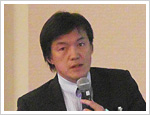
以前より小児先天性疾患(尿素サイクル異常症)に対して用いられているフェニルブチレートは、ヒストン脱アセチル化酵素阻害作用を持つ、HDAC inhibitorのひとつである。芳香族脂肪酸に分類される安定した物質で、他の薬剤との相互作用がない、副作用が少ない、経口投与可能、標準治療との併用が可能、標準治療無効例に対して単独でも治療効果が期待できる、などの特徴がある。
我々のクリニックでは、固形がんを中心に、フェニルブチレートによる治療を行っている。評価し得る49例のうちstage4が94%(46例)、61%(30例)が標準治療と併用であった。副作用は、胸焼け、胃のムカつき感、腹満感など消化器症状がほとんどで、すべてgrade1であった。フェニルブチレート単独での著効例や、抗がん剤との併用により抗がん剤単独より効果がみられた例などがあり、難治性の症例に対してのオプションとして期待できる治療法である。
- パネルディスカッション
-

鈴木先生、秋山先生、山下先生、澤登先生によるパネルディスカッションが行われました。会場の参加者の方からも活発な質問が寄せられ、エピジェネティクスの新しいメカニズムや生活習慣との関連などに関して、議論が交わされました。
- 懇親会
-



-
The 6th symposium
- Lecture
-
-
Special lecture 1
"Dysregulation of microRNA in gastrointestinal cancer and its clinical application"
Hiromu Suzuki (Department of Molecular Biology, Sapporo Medical University School of Medicine)
-

Recent studies have shown that microRNAs (miRNAs) play important roles in the development of cancer, and that epigenetic mechanisms are deeply involved in their dysregulation. Technological advances that enable comprehensive analysis of miRNA expression profiles and the epigenome in cancer cells have led to the identification of a large number of epigenetically regulated miRNAs. As with protein-coding genes, it appears that miRNA genes involved in regulating cancer-related pathways are silenced in association with CpG island hypermethylation and altered histone modification. Aberrant DNA methylation of miRNA genes is a potentially useful biomarker for detecting cancer or predicting its outcome, and re-expression of the miRNAs could be an effective approach to cancer therapy. In this symposium, I will present our recent studies on epigenetic dysregulation of miRNA in gastrointestinal cancer and its clinical application.
-
Special lecture 2
"Epigenetics and lifestyle factor"
Yoshimitsu Akiyama (Department of Molecular Oncology, Graduate School of Medical and Dental Sciences, Tokyo Medical and Dental University, Tokyo, Japan.)
-

Epigenetic changes are closely associated with various types of diseases including cancer, diabetes and hypertension. Growing evidences demonstrate the strong relationships between the environmental/lifestyle factors and risk for the diseases. Epigenetic approaches in cancer epidemiology, so-called the “epigenetic epidemiology”, are used, and it has been reported that several lifestyle factors, such as diet, smoking, alcohol consumption and physical activity, may influence DNA methylation patterns. We studied the DNA methylation status of tumor-related genes in gastric cancer tissues, and then compared to past lifestyle of the patients. DNA methylation levels were inversely related to green tea intakes and physical activity. It has been known that DNA methylation changes are also found in blood leukocyte DNA from the cancer patients, in which alterations were significantly associated with some environmental/lifestyle factors. Thus, methylation of leukocyte DNA is possible to be one of the useful surrogate markers for predicting the risk for cancers. In addition to the development of newly epigenetic drugs, the strategies involving a lifestyle improvement might be beneficial in preventing epigenetic alterations and counteracting cancer.
-
Research Presentation
"Possibility of epigenetic therapy using phenylbutyrate for cancer"
Keishi Yamashita (Department of Surgery, School of Medicine, Kitasato University)
-

The standard treatment for cancer is multidisciplinary therapy combining surgery, anticancer drugs, radiation and molecular-targeting therapies, and a certain degree of success has been achieved. On the other hand, the toxicity and effectiveness of multidisciplinary therapy have almost reached their limits and a new therapeutic modality with low toxicity is needed for the future. In regard to genetic changes, epigenetic changes are more frequent than genomic changes in cancer and expectations for epigenetic therapy have increased. In order to use epigenetic therapy as a new cancer treatment tool, we started a study focusing on the anticancer effect of phenylbutyrate (PB), which possessed histone deacetylases (HDAC)-inhibitory effect. A satisfactory anticancer effect of PB at clinical doses was confirmed in breast cancer cell lines. However, the effect varied among the cell lines. In the study of the gene expression profiles, remarkable differences were observed among the cells in the expressions of chemotherapy-resistant molecules such as AKRD1, AXL and caveolin-1/2, as well as in the expressions of methylated tumor suppressor genes such as TFAP2B. We propose to study about the reactivities of these genes to PB and to other epigenetic therapeutics, in an attempt to contribute to identification of the most important molecule. In addition, these data may be applied as a PB therapy sensitivity prediction marker and also as practical data from the aspect of clinical application.
-
Case report
"Clinical experience with phenylbutyrate"
Masakazu Sawanobori, Director, Sanbancho Gokigen Clinic -

Phenylbutyrate is one of HDAC inhibitors with histone deacetylase inhibiting activity that has been used for the treatment of an infant congenital disease (urea cycle disorder). It is a stable substance classified as an aromatic fatty acid and is characterized by a low likelihood of interaction with other drugs, fewer side effects, availability for oral use, availability for use in combination with standard therapy, and its expected curative effect in non-responders to standard treatment with a single drug.
At our clinic, phenylbutyrate is mainly applied for the treatment of patients with solid carcinomas. Among the 49 evaluable cases, 94% (46) were classified as having stage 4 disease and 61% (30) were treated with the drug administered in combination with the standard treatment. Most of the side effects observed pertained to the digestive symptom, including symptoms such as heartburn, stomach retching and a feeling of fullness, and in all cases, the symptoms were classified into grade 1. Some complete responses were observed in the phenylbutyrate monotherapy group, and some relatively better responses were also observed in the cases receiving combination therapy with phenylbutyrate than in those receiving monotherapies with other anticancer agents. Therefore, therapy with phenylbutyrate may be a promising treatment option for intractable cases.
-







